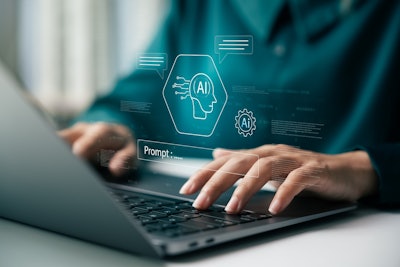
B2C has historically led the way in leveraging AI to enhance customer experience. From personalized product recommendations to chatbots guiding customers through purchase decisions, AI has played a critical role in enhancing the shopping experience for consumers. But now, manufacturers, distributors, wholesalers and other B2B companies are catching up and, in many ways, pulling ahead.
In a 2025 report from Algolia, 67% of B2B ecommerce companies shared they are actively using AI to drive growth. This rate of adoption reflects a shift in the industry mindset. B2B companies, historically more cautious with new technologies, are now embracing AI to solve the unique challenges they face and increase efficiency. These include complex sales cycles, customized product configurations, long-term customer relationships and large volumes of data spread across systems. As a result, AI is becoming an essential tool in delivering and prioritizing efficiency, accuracy and scalability.
How AI Is Driving Real Operational Gains in B2B
One of the most significant opportunities for AI in B2B is reordering automation. In many B2B industries, customers place the same or similar orders at regular intervals. AI can analyze past purchase behavior to predict when customers will reorder and pre-fill their cart. This removes friction and builds trust by anticipating customer needs. It's a small touch that can go a long way toward maintaining customer relationships, which increases the rate of retention. Lance Owide, BigCommerce
Lance Owide, BigCommerce
Sales automation is another major area of transformation. With AI, sales teams can identify the right moments to cross-sell or upsell and quickly receive indicators of when a customer might be at risk of ending the relationship. These insights allow teams to take action early, before a decision to churn is made. AI also helps uncover trends across accounts, surfacing opportunities that a salesperson might otherwise miss. For example, AI tools can highlight patterns in buying behavior that point to a broader need for a new solution, prompting the sales team to reach out with a targeted offer.
Manufacturers are also seeing measurable returns. Predictive AI is helping them fine-tune their demand forecasting. This means fewer stockouts, better inventory planning and smarter production scheduling. When your customer base is placing large-scale, high-value orders, timing is everything. Reducing downtime and avoiding overstock not only cuts costs but keeps customers happy and coming back.
Customer service is another area where AI is proving its value. AI tools can quickly handle order tracking, returns and now, more advanced troubleshooting, which frees up service teams to handle more complex issues that need a human touch. HubSpot notes that 78% of sales professionals believe AI helps them focus on the most critical parts of their job. This ability to automate repetitive tasks while enhancing high-value customer-focused interactions makes AI a key enabler of more strategic work across the organization.
Real Companies, Real Impact
These aren't just hypothetical benefits. Companies are seeing results. Destaco, a global manufacturer specializing in robotics and material handling, has integrated AI-powered technical support into its operations. This helps customers get fast answers to common questions and allows the sales team to turn leads into conversions more efficiently.
Another example comes from PramWorld, a distributor and retailer in the infant product space. By implementing AI-powered product recommendations, they increased purchase conversion rates by 90% and boosted revenue by 275%, from customers who interacted with the AI-recommendations. These powerful results show how AI can significantly improve business performance when aligned with customer needs.
AI-powered search engines are also transforming how buyers find what they need. In the B2B space, customers may not always know a product's exact name or part number. AI tools that understand the context of a search, whether through text or images, can return relevant, accurate results. This makes the buying process faster and more intuitive, even for complex orders.
What B2B Can Learn from B2C
Even though B2B is beginning to gain ground on B2C in terms of AI integration, there are still important lessons to learn from early adopters in the consumer space.
The first is the importance of clean, connected data. AI is only as smart as the data it receives. For B2B organizations, that means aligning systems like ERPs, CRMs, and ecommerce platforms. Structured, up-to-date data enables AI to provide accurate insights and recommendations. It also helps reduce errors in things like pricing, shipping and order fulfillment.
Another takeaway is the expectation of convenience. B2C brands have conditioned customers to expect fast, simple and seamless experiences. Today, B2B buyers expect the same level of service in their work lives. This includes intuitive interfaces, quick support and the ability to move fluidly between digital and human touchpoints. Meeting these expectations is no longer just a nice-to-have, they are a requirement.
Omnichannel integration is another concept that B2B can borrow from B2C. Whether a customer interacts via a mobile device, a laptop or directly with a sales rep, the experience should be consistent and connected. AI tools can help unify these channels by sharing insights across touchpoints and helping teams deliver a coherent experience.
Looking Ahead
B2B companies are embracing AI not just to keep up with the times but to leap ahead. In a space where efficiency, accuracy and customer satisfaction are all critical, AI offers a clear path forward. By learning from B2C experiences and applying AI to their own complex workflows, B2B organizations can operate more strategically and serve their customers more effectively.
As this transformation continues, executives and business owners in the B2B sector should view AI not as a trend but as a business necessity. Investing in AI today lays the groundwork for more resilient, agile and competitive operations in the future.
For more information, visit www.bigcommerce.com.





















